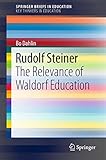Rudolf Steiner [electronic resource] : The Relevance of Waldorf Education / by Bo Dahlin.
Material type: TextSeries: SpringerBriefs in EducationPublisher: Cham : Springer International Publishing : Imprint: Springer, 2017Description: XI, 143 p. online resourceContent type: text Media type: computer Carrier type: online resourceISBN: 9783319589077Subject(s): Education | Philosophy and social sciences | Teaching | Education -- Philosophy | Education | Educational Philosophy | Alternative Education | Teaching and Teacher Education | Philosophy of Education | Learning & InstructionAdditional physical formats: Printed edition:: No titleDDC classification: 370.1 LOC classification: LC8-6691Online resources: e-book Full-text access
TextSeries: SpringerBriefs in EducationPublisher: Cham : Springer International Publishing : Imprint: Springer, 2017Description: XI, 143 p. online resourceContent type: text Media type: computer Carrier type: online resourceISBN: 9783319589077Subject(s): Education | Philosophy and social sciences | Teaching | Education -- Philosophy | Education | Educational Philosophy | Alternative Education | Teaching and Teacher Education | Philosophy of Education | Learning & InstructionAdditional physical formats: Printed edition:: No titleDDC classification: 370.1 LOC classification: LC8-6691Online resources: e-book Full-text access | Item type | Current library | Collection | Call number | Copy number | Status | Notes | Date due | Barcode |
|---|---|---|---|---|---|---|---|---|
| E-Books | MEF eKitap Kütüphanesi | Springer Nature | LC8 -6691 (Browse shelf (Opens below)) | Available | NATURE | 1420092-1001 |
Chapter 1: Introduction -- Chapter 2: Steiner's biography -- 2.1 The formative years: childhood and youth -- 2.2 Steiner as a young man and his philosophical period -- Chapter 3: The relevance of Steiner's philosophy for education -- Chapter 4: Anthroposophy -- 4.1 A spiritual anthropology of education -- 4.2 The far-sighted view: the lifespan development of the individual and the evolution of humanity -- Chapter 5: Some basic principles and practices of Waldorf education -- 5.1 The curriculum -- 5.2 Being a Waldorf teacher -- Chapter 6: The social and political aspects of education -- 6.1 Social three-folding: state, culture and economy -- 6.2 Education as a cultural practice -- Chapter 7: Does it work? Empirical studies of Waldorf schools -- Chapter 8: Conclusion.
This book covers Rudolf Steiner's biography, presented from an educational point of view and also unfolds the different aspects of Steiner's educational thought in Waldorf Education. His point of view is unique in that it relates education to a wide horizon of different contexts, such as social, pedagogical, evolutionary and spiritual aspects. His ideas are philosophical (ethical, epistemological, ontological). However, above all, they are based on spiritual understanding of the human being and the world. In many ways, they stand in stark contrast to the views that inform present mainstream educational thought and practice. Nevertheless, there are points where Steiner's ideas can find a resonance in more recent educational thought. Steiner was in many ways ahead of his time and his educational ideas are still relevant to many present day educational issues and problems.
5
